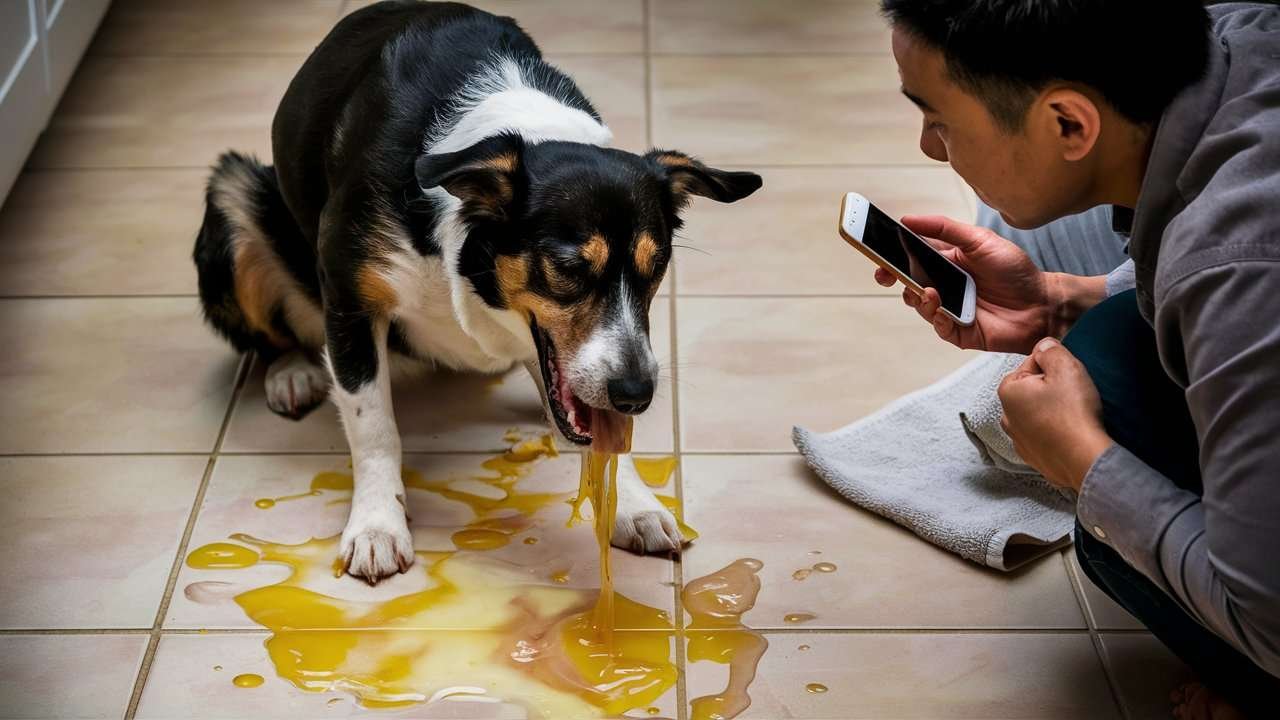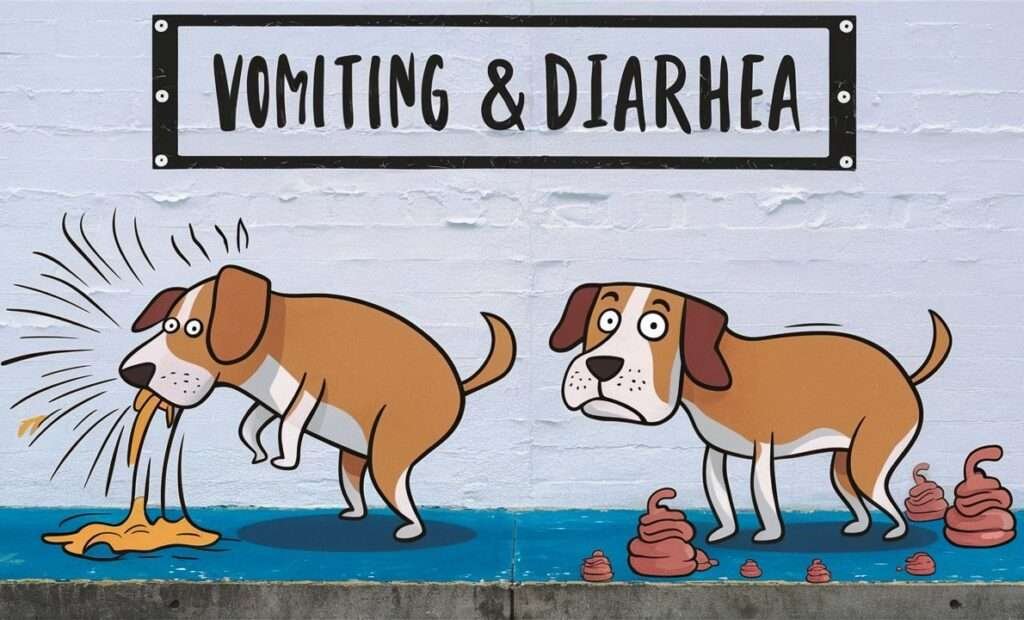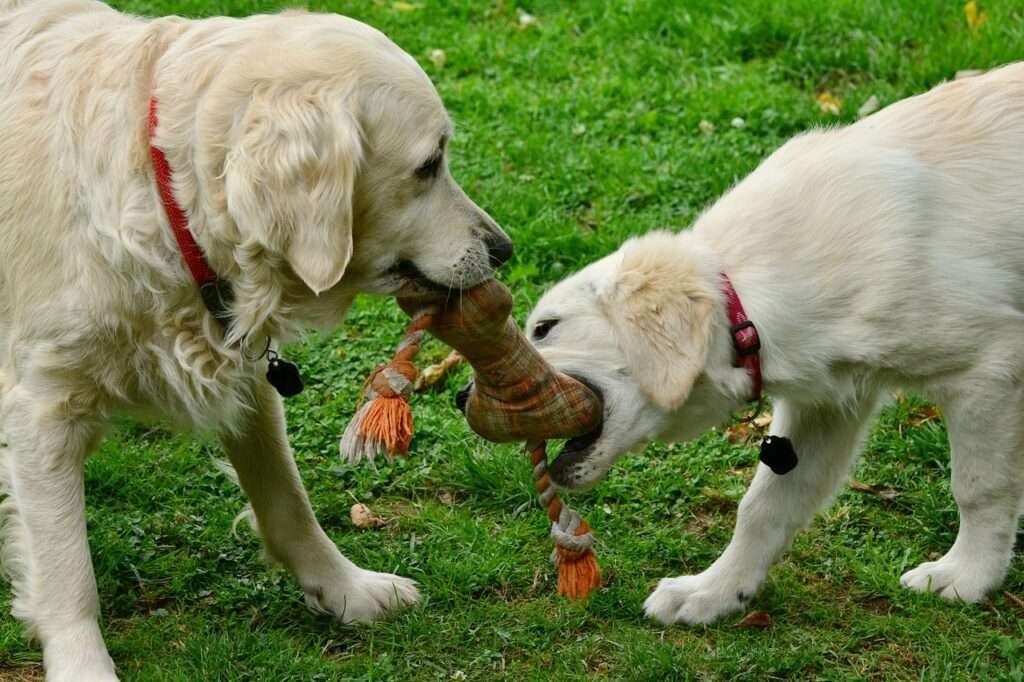Dogs are beloved members of our families. They give us companionship and love. However, just like us, our dogs can get sick too? I want to help you understand and optimize their health so that they can live the long and happy life that you want for them. Two health issues that dogs commonly face are diarrhea and vomiting. These symptoms can be worrying for not only dog but any pet owner. From my personal experience I have written this article which covers causes, symptoms, and treatments of dog diarrhea and vomiting in simple and easy way.
Table of Contents
ToggleUnderstanding the cause of Dog Diarrhea and vomiting.
Let’s talk about causes of diarrhea and vomiting in dogs. There are lots of causes. The important thing to know is that there are so many causes, and you need a diagnosis first to understand how to deal with a dog with vomiting and diarrhea. Obviously, vomiting and diarrhea can lead a dog to dehydration. They can get very, very sick because they can’t take any fluids in, and fluids are all coming out.
There are multiple causes. You can see viral causes like parvovirus in puppies that can cause diarrhea and vomiting. Dogs getting into the trash can also cause bacterial contamination, which leads to diarrhea and vomiting. Foreign bodies, like things they ate that they weren’t supposed to, such as bones or toys, can cause that as well. A sudden change in a dog’s diet can cause diarrhea. If you switch your dog’s food, it’s best to do it gradually over several days to avoid stomach upset. Dogs are naturally curious and often use their mouths to explore, which can lead to eating something that upsets their stomach. This could be garbage, spoiled food, or even certain plants.
We see lots of vomiting and diarrhea from pancreatitis. Pancreatitis most commonly comes from a dog eating people food, especially food that is higher in fats. Some dogs are sensitive to certain foods or ingredients, which can lead to diarrhea. Common allergens include beef, dairy, wheat, and chicken. This can also be a very common cause. Bacterial, viral, and parasitic infections can also cause diarrhea and vomiting. Common culprits include parvovirus, distemper, and worms. Certain medications, such as antibiotics, can disrupt the natural balance of bacteria in a dog’s gut, leading to diarrhea and vomiting.
In Some underlying health conditions, such as inflammatory bowel disease (IBD), liver disease, or pancreatic disease, can cause chronic diarrhea. Bacterial, viral, and parasitic infections can also cause vomiting. Common infections include parvovirus and kennel cough. Just like in humans, stress can affect a dog’s digestive system. Changes in the environment, such as moving to a new home or the introduction of a new pet, can cause stress-induced diarrhea or vomiting. Some dogs may vomit if they eat something that doesn’t agree with them. Some dogs get car sick and may vomit during or after a car ride just like a human child.
The important thing to know is that it can be bacterial, viral, or something they ate off the ground or outside, like a dead animal. All of these causes generally lead to the same thing: vomiting and diarrhea, which risk dehydration.
Symptoms of Diarrhea in Dogs |
Symptoms of Vomiting in Dogs |
|
– Vomiting – Loss of appetite – Lethargy (tiredness) – Abdominal pain or cramping – Dehydration (dry gums, sunken eyes, lethargy) |
– Drooling – Nausea (licking lips, swallowing frequently) – Loss of appetite – Lethargy – Abdominal pain |
Expert Tips for Quick Relief and Recovery of Diarrhea
Your dog’s got diarrhea, and you want to clear it up as quickly as possible, but you don’t know what to feed them. Should you actually be starving them? What about giving them probiotics? One of the most common recommendations out there is actually wrong. You should never starve your dog. Starving will have one benefit: it will reduce the amount of diarrhea they’re producing, but it’s actually going to mean that their diarrhea lasts for a lot longer. The reason for this is that the lining cells of the colon and intestines require food in the guts for their nutrition. They don’t get their food and energy from the blood supply; they get it from the intestinal contents.
So by starving your dog, you’re actually starving the lining cells of the gut, hurting the very cells that you want to get better. You don’t need to feed a full amount to get this benefit, but it is important that your dog gets some nutrition. So what’s the best thing to feed your dog? In general, you either want to stick to your dog’s normal diet or feed a diet that’s specially formulated for dogs with sensitive, upset stomachs. We’ll come on to why in just a minute. But we certainly need to avoid rich foods, salty foods, and fatty foods. That means no treats because they’re much more likely to upset your dog’s intestines further and prolong their diarrhea.
If you want to home cook for your dog, you can give them things like scrambled eggs. Just make sure you avoid adding butter or milk, which could cause further upset. You can boil up some chicken or give them cottage cheese. These are all very easily digestible food sources that will help your dog get the energy they need while also feeding the gut at the same time. You should give them smaller, more regular meals rather than feeding them once or twice a day like you normally do. Also, make sure they have a good supply of water. You can encourage them to drink by adding ice cubes, chicken broth, or tuna juice. You can also give them specially formulated pet electrolytes to help maintain their hydration levels, especially if your dog’s diarrhea is very watery and they’re losing a lot of electrolytes.
What about probiotics? Probiotics can be beneficial and will help clear up and stop your dog’s diarrhea much faster. You can give human probiotics; they won’t hurt your dog, but they won’t be nearly as effective as a species-specific probiotic. That’s because the bacteria in our intestines are different from those in your dog’s intestines. If you give a human product, be careful it doesn’t contain anything dangerous like xylitol, which is an artificial sweetener that can cause low blood glucose and liver failure. Choosing something like Fortiflora for dogs is a good option and can help prevent diarrhea if your dog needs antibiotics or always has a sensitive stomach.
Prebiotics are something else you can give your dog. Common ones are FOS and MOS (fructooligosaccharide and mannanoligosaccharide). These work by feeding the good bacteria in the gut and starving the bad bacteria. They help correct the imbalance that happens in a dog with diarrhea for almost any reason. Prebiotics and probiotics are often included in diets designed for intestinal recovery, which is why choosing a diet specially formulated for your dog’s condition is beneficial. If your dog hasn’t been treated for worms in the last few months, you should give them a treatment because a parasite buildup could be causing problems. It’s important to remember that most dogs with diarrhea do not need antibiotics. Antibiotics can actually make things worse because they don’t target just one type of bacteria; they affect the entire intestinal flora, which can make diarrhea worse and take weeks or months to return to normal.
If your dog has stopped eating, is lethargic, vomiting, or unwell for any other reason, you need to see your vet. If the diarrhea isn’t clearing up by itself within three to five days, especially if they’re a puppy, you shouldn’t wait as long as you would with a healthy adult dog. If your dog has blood in their stool or really bloody diarrhea, make sure you check out this other video linked on screen for everything you need to know about bloody diarrhea. Until next time, I’m Dr. Alex. This is Our Pets Health because they’re family.

Expert Tips for Quick Relief and Recovery of Vomiting (Yellow & White Foam)
We talk about two internal reactions, which are physiological, which are related to the internal digestive system, then one of the gases is that bile duct, there is a problem in it. There is a liver, there is a liver inside the dog too, from there comes the bile duct which makes bile juice, so guys, if your dog is on an empty stomach, in the morning time, this is the access amount that you are seeing on the screen, which is the foam type, which you are getting this vomiting is visible, it may also be a little white. They give it only on an empty stomach.
If you believe this, if blood comes inside it, then it could be some other disease, then you have this emergency case. If suppose there is blood coming inside it, then you should definitely consult your vet. If there is a problem, let’s talk about this foam, it is low foam, it is being made above the meeting. It is the time of empty stomach, due to retention, whatever liquid is inside it or juice comes out. I am telling you that to treat it, first of all, if you have an empty stomach, eat some bread in the morning, whatever if you are fine. And it is very important to feed something or the other. You guys also have breakfast in the morning.
Similarly, we also have to make our dogs have breakfast so that there is no bile duct irritation. If this is the type of vomiting, then the local cure for it is this, if we talk about any medicine. It is an oral suspension, which is a liquid suspension. You can give it to your dog, if your dog is a puppy, say, the pup is small, one month or one and a half months old, such things are happening to him. We will give this to your dog, what do you have to do in it, you have to provide 0.2 to 0.3 ML of it. If by chance you do not have it at home, then with the help of a syringe, you must make him drink it. You have to repeat it daily, three times a day.
Diarrhea and vomiting in dogs are common issues that can be caused by a variety of factors, from dietary indiscretion to serious underlying health conditions. While these symptoms can be distressing, prompt veterinary care and proper home management can help your dog recover quickly. By understanding the causes, symptoms, and treatments of diarrhea and vomiting, you can take better care of your furry friend and ensure their health and well-being. Always consult with your vet if you have any concerns about your dog’s health, and remember that prevention is key to keeping your dog happy and healthy.




